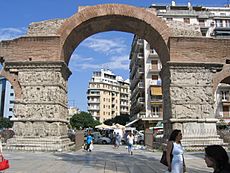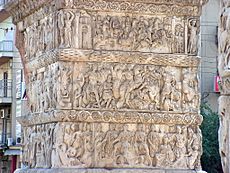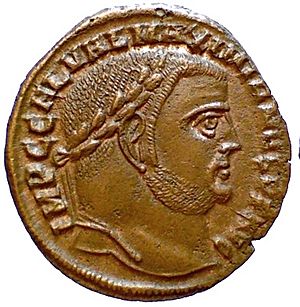Galerius facts for kids
Galerius (full name Gaius Galerius Valerius Maximianus) was a Roman Emperor. He ruled from 305 to 311 AD. He was born around 260 AD and died on May 5, 311 AD.
Galerius was a brave and skilled soldier. In 293 AD, he became a Caesar. This was a junior emperor role. He shared this role with Constantius Chlorus. This happened when the Tetrarchy system began. The Tetrarchy was a way to rule the Roman Empire with four leaders. Galerius married Valeria, who was the daughter of Emperor Diocletian. He was then put in charge of the provinces in the Illyrian region.
Contents
War with Persia
Early Defeat
In 296 AD, a war started with the Persian Empire. Galerius moved his army from the Danube River to the Euphrates River. His first battle against the Persian leader Narses ended in defeat. This happened near a place called Callinicum. Because of this loss, the Romans lost control of Mesopotamia.
Emperor Diocletian came to Antioch. He made it clear that Galerius was to blame for the defeat. Diocletian even made Galerius walk a mile in front of his imperial cart. Galerius was still wearing his emperor's robes. This showed everyone that the loss was not the army's fault. It was seen as Galerius's mistake.
Roman Victory
In 298 AD, Galerius received more soldiers. These new troops came from the Danube region. He led his army to attack Narseh in northern Mesopotamia. Narseh's forces had to retreat into Armenia.
The land in Armenia was rough and hilly. This was good for the Roman infantry (foot soldiers). But it was bad for the Sassanid cavalry (soldiers on horseback). Local people helped Galerius. This allowed him to surprise the Persian army. Galerius won two battles against Narseh.
In the second battle, Roman soldiers captured Narseh's camp. They also took his treasury, which held all his riches. Narseh's wife was kept in Daphne, a town near Antioch. She stayed there for the rest of the war. This was a constant reminder to the Persians of Rome's victory. Galerius then moved into Media and Adiabene. He won more battles, especially near Erzurum. He also secured the city of Nisibis (Nusaybin, Turkey) by October 298 AD. He traveled along the Tigris River. He captured Ctesiphon and saw the ruins of Babylon. Then he returned to Roman land by way of the Euphrates River.
Narses asked for peace. As a result, Mesopotamia was returned to Roman rule. Rome even gained some land east of the Tigris River. This was the largest the Roman Empire ever became in the east.
Later Years
In 305 AD, Emperors Diocletian and Maximian both stepped down. Galerius then became an Augustus. This was the highest title for an emperor. His former colleague, Constantius, also became an Augustus. Two younger men were chosen as Caesars. They were Maximus Daia and Severus II.
Galerius's plans changed when Constantius died in York in 306 AD. Constantius's son, Constantine, was then made Augustus by his soldiers. Galerius found out when Constantine sent him a letter. Constantine explained his father's death. He also said that his soldiers had made him emperor. Galerius was surprised, disappointed, and angry at first. He even threatened to burn the letter and kill the messenger.
But Galerius thought about it more. He realized that fighting a war against Constantine would be difficult. So, he accepted Constantine as the ruler of the western provinces. However, he only gave Constantine the title of Caesar. This meant Constantine was the fourth-ranked Roman prince. Galerius gave the higher title of Augustus to his favorite, Severus II.
Suddenly, Galerius faced another problem. Italy was lost to Maxentius. Galerius needed more money for the empire. So, he ordered a very strict check of everyone's property. This was to make sure people paid their taxes. If there was any doubt, people were forced to declare all their wealth.
Italy had always been free from taxes. But Galerius ignored this tradition. The people of Italy were very unhappy. Maxentius used this anger to declare himself emperor in Italy. Galerius was furious. He ordered Severus to march to Rome right away. Galerius hoped Severus would quickly stop the rebellion. But Severus was captured and killed by Maximian. Maximian had become co-emperor again, this time with his son Maxentius.
Galerius knew he had to act. He led a large army from Illyricum and the East into Italy. He wanted to get revenge for Severus's death. He also wanted to punish the rebellious Romans. But Maximian was very clever. Galerius found every place defended and hard to reach. He managed to get as far as Narni, which was sixty miles from Rome. But his control in Italy was only within his army camp.
Galerius saw that he was in trouble. He tried to make peace. He sent two officers to talk to the Romans. But the Romans firmly rejected his offers. They refused his friendship. They warned him that he might suffer the same fate as Severus if he did not leave. Galerius had to leave quickly. Maxentius had given large amounts of money to Galerius's soldiers. This made many of them want to leave Galerius and join Maxentius. It was very hard for Galerius to stop his veteran soldiers from deserting him as he left Italy.
Galerius was frustrated. He allowed his soldiers to destroy the countryside as they marched north. Maxentius chose not to fight a major battle.
With so many emperors now, Galerius decided to act. In 308 AD, he called a meeting. The retired emperor Diocletian and the active Maximian also attended. This meeting was held at Carnuntum on the Danube River. They wanted to fix the situation and bring order back to the government. At the meeting, they agreed that Licinius would become Augustus in the West. Licinius was a long-time friend of Galerius. He had been in charge of defending the Danube while Galerius was in Italy. Constantine would be his Caesar. In the East, Galerius remained Augustus, and Maximinus remained his Caesar. Maximian was told to retire again. Maxentius was declared a rebel.
Galerius's plan soon failed. Maximinus ruled the provinces of Egypt and Syria. When he heard about Licinius's promotion, he refused to stay as Caesar. Despite Galerius's pleas, Maximinus demanded the equal title of Augustus. For the first and only time, six emperors ruled the Roman world. Even though a recent war had divided the empire, their fears and Galerius's weakening power led to a period of calm.
In his last years, Galerius remained the most important emperor among them. He spent his time enjoying himself. He also ordered some important public works. For example, he drained extra water from Lake Pelso into the Danube River. He also cut down the huge forests around the lake.
Persecution of Christians


Christians had lived peacefully for most of Diocletian's rule. But in 303 AD, a new law was made. This law started a time of persecution against Christians. Christians believed Galerius was behind this. Their churches and meeting places were destroyed. This was because people feared secret gatherings.
However, in April 311 AD, Galerius issued a new law. This law allowed Christians to practice their religion freely. He issued it from Nicomedia in his own name. Licinius and Constantine also signed it. This marked the end of the official persecution of Christians. Galerius died on May 5, 311 AD.
Images for kids
-
A detail from the Arch of Galerius in Thessaloniki, Greece. It shows Galerius attacking Narseh. Thessaloniki was where Galerius did most of his work.
-
Gamzigrad-Romuliana, Galerius's palace in Zaječar, Serbia. Today, it is a UNESCO World Heritage Site.
See also
 In Spanish: Galerio para niños
In Spanish: Galerio para niños
 | Kyle Baker |
 | Joseph Yoakum |
 | Laura Wheeler Waring |
 | Henry Ossawa Tanner |





